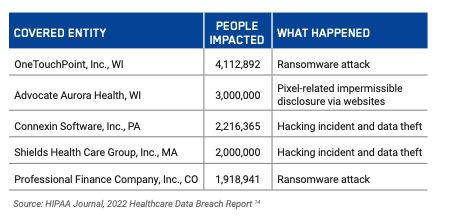Cybersecurity Best Practices for Healthcare Organizations

Healthcare organizations are facing increasing cybersecurity risks due to digitization. Cyberattacks can disrupt operations and even prove fatal for patients. Cybercriminals are increasingly sophisticated and well-funded. Healthcare organizations need adequate technology and controls in place to protect patient data and organizational operations.
Patient health information is valuable to cybercriminals and can be used for identity theft, fraud, and other crimes. Healthcare organizations need to be aware of the risks and take steps to protect themselves from cyberattacks.
Recent Healthcare Cybersecurity Breaches
At the beginning of February 2023, the U.S. Department of Health and Human Services Office for Civil Rights had 877 cases under investigation. Nearly 79 million American lives were impacted by breaches affecting over 500 users per organization.
Additionally, here were the top five data breaches of 2022:

Cyberattack Protection Remains Critical as Healthcare’s Attack Surface Continues Expanding
The healthcare industry is a prime target for cyberattacks. Healthcare organizations must take steps now to protect themselves from these attacks.
Said Kelvin Dickenson, Senior Vice President, Risk and Compliance, SAI360, “Having inadequate technology and controls in place to manage healthcare’s sizable attack surface exposes organizations to unnecessary risk to patient data and organizational operations.”
By implementing strong security measures and training employees on cybersecurity best practices, healthcare organizations can protect patient data and organizational operations.
“It is crucial to update cybersecurity and enterprise risk management practices to reduce the probability of a cyber event. As is informing all colleagues, business associates, and other third parties, across all levels, about the severity and potentially disastrous effects of cyberthreats and the policies they must follow to reduce the risk,” Kelvin said. “Ultimately, healthcare leaders must know this: It is not if a data breach will hit your organization; it is when.”
Learn more in our whitepaper, Smart Cyber Defenses Demand a Strategic Approach and Recognized Best Practices. Request whitepaper by completing the form below.



